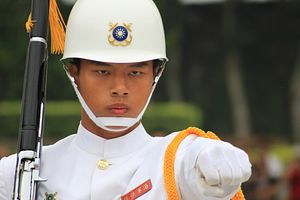For the first time in 16 years, the Taiwan-U.S. Defense Business Forum was hosted last week on Taiwan — a historic opportunity for business executives and government officials to meet on Taiwanese soil to discuss U.S.-Taiwan defense cooperation in the shipbuilding, cybersecurity, and aerospace industries.
The annual forum, held since 2002 in the United States, took place on May 10 and was organized by the U.S.-Taiwan Business Council and the Taiwan Defense Industry Development Association. This year’s forum was held amidst heightened cross-strait tensions following the signing into U.S. law of the Taiwan Travel Act and a recent decision to allow for the transfer of U.S. submarine technologies.
The forum attracted some 300 delegates, including Taiwanese ministers, legislators, academics, and Taiwanese defense companies, along with a small group of some two dozen pro-unification protesters gathered outside the forum. While U.S. defense contractors Lockheed Martin, General Dynamics, and BAE Systems sent a handful of mid-level executives, notably absent were U.S. government officials — whose overseas travel to Taiwan is specifically encouraged by the Taiwan Travel Act. Earlier defense forums held in the United States included government officials from the U.S. Department of State, Department of Defense, and the Defense Security Cooperation Agency, but their continued presence at the defense forum in Kaohsiung was likely seen as an unnecessary provocation of China.
“The deepening U.S. defense cooperation with Taiwan is an act of gross interference in China’s domestic affairs. It’s a very serious matter for the Chinese mainland,” Zhu Songling, a professor at the Institute of Taiwan Studies in Beijing Union University, told the Global Times.
“Further moves that promote concrete military exchanges will invoke a strong response from the mainland, even prompt the Chinese mainland to use non-peaceful means to resolve the Taiwan question,” he added.
Beijing’s strong response the day after the forum failed to take any note of concessions from Taipei, however. China’s H-6K nuclear-capable bombers, fighter jets, and spy planes flew around the island, some tailed by Taiwan Air Force F-16s and indigenous defense fighters. The angry response was also linked to events the same day in Washington, where the Armed Services Committee of the U.S. House of Representatives voted 60-1 on a draft bill (the National Defense Authorization Act) that would help strengthen Taiwan’s military capability by expanding joint military training and supporting U.S. arms sales to Taiwan.
While efforts to downplay the defense forum appear not to have tempered Beijing’s wrath, greater cooperation among the Americans and Taiwanese has been forged. By choosing to bifurcate the traditional annual forum into two sessions per year, defense policy issues can still be addressed face-to-face with government officials in the United States, while an additional opportunity to discuss strictly commercial opportunities has been created in Taiwan. With the passage of the Taiwan Travel Act, Taipei is expected to send several high-level officials from Taiwan’s Ministry of National Defense and other governmental institutes to the next forum to be held in Washington later this year.
And if we believe the latest polls, the psychological warfare being waged by Beijing is having little effect on the Taiwanese population besides driving them further away from the mainland — some 80 percent of Taiwanese think China is unfriendly toward Taiwan with 75 percent considering themselves Taiwanese, rather than Chinese. Furthermore, few Taiwanese are losing sleep over fear of an impending invasion. Nearly two-thirds (64.5 percent) of Taiwanese do not believe China’s military will invade Taiwan, while only 25.7 percent think an attack is likely.
Despite grave threats of using “non-peaceful means” to resolve sovereignty claims over Taiwan, Beijing’s military response has recently been limited to either live-fire military exercises or flying its bombers, fighter jets, and spy planes around the island. Ultimately, the decision by the forum’s organizers to appease Beijing by not including U.S. government officials did little to temper China’s response, and may have run counter to public support for active exchange of government officials under the Taiwan Travel Act.
Gary Sands is a Senior Analyst at Wikistrat, a crowdsourced consultancy, and a Director at Highway West Capital Advisors, a venture capital, project finance and political risk advisory. He is currently based in Taipei.

































